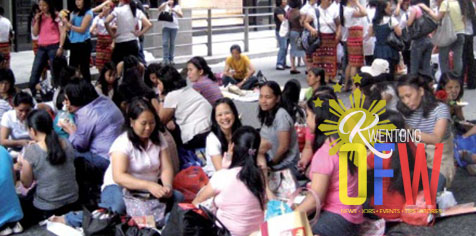HONG KONG – A common scenario every day, “A maid pushing an elderly man’s wheelchair while talking to someone in her mobile phone.”
This scene is happening every single day in Hong Kong as its residents already employed 358,000 domestic helpers as of March, this year. This number constitute to at least one in every 7.3 households.
Because of the rising demand, the government of Hong Kong together with Cambodia signed a new agreement to open another source of supply.
The first batch of 1,000 housemaids are undergoing intensive training for a duration of 3 months. They will be studying Cantonese, proper care for the elderly and Chinese cooking. If everything goes smooth, there will be a total of 10,000 housemaids to be employed every year.
Following the ban of Myanmar in sending housemaids due to hovering cases of abuse and exploitation, Hong Kong negotiated with the Government of Cambodia and its first 100 arrived way back 2014.
The two largest suppliers of domestic helpers are Indonesia, 156,000 and Philippines, 193,000.
Both countries expressed concern regarding the rising number of abuses yet President Joko Widodo of Indonesia released a statement in his recent visit in Hong Kong which states that, “We are happy that workers in Hong Kong are protected by strong laws. I observe that they receive salaries that are pretty good compared to other countries. I believe many are happy to be working in Hong Kong.”
The huge demand of maids signifies their important role in the growing economy of Hong Kong ever since its first import in 1974.
“The ratio of domestic maids per household is one of the highest in Asia,” said company manager Leung Mai-ling. “They have been essential to the liberation of women in Hong Kong, giving us the chance to pursue our professions, gain a high position and earn a good salary. In most western countries, affordable and convenient domestic help is not available.”
Most working moms employ domestic maids as they are too busy to take care of their family.
“Without them, would Hong Kong have so many women executives, financial officers and senior civil servants and teachers?” said Leung. “We do not see this in Japan and South Korea, where women are similarly well educated. Would Carrie Lam be able to become chief executive if she had not employed maids?”
Their benefits include a salary of HK$4,310/month, a ticket every year and other incentives. With that, working moms earning HK$10,000/month has the ability to pay for their maids, in addition to the comfort of knowing that your loved ones are properly taken-cared of.
“The maids cannot get the right of residence after seven years nor do their children if they are born here. Without an employer, they cannot stay here. I like the regulatory system,” said a secondary teacher who happily employs a domestic helper. “Our city is densely populated. We cannot afford a large new group of citizens with their families. The rules are strict and should remain so,” he added.
Contrary to that, Cynthia Abdon-Tellez of Mission for Migrant Workers do not agree with that, saying: “They face high levels of stress, living in someone’s house 24 hours a day, seven days a week. They do not have a place or people around them to vent their frustrations. The use of a phone is limited sometimes or even prohibited.”
But her demands will never be addressed because the government is on the side of employers. One Hong Kong resident also said, “I am seeking a maid to help look after my elderly parents.”
“I do not want a Filipina. They have been here too long and know the system too well.” Wong Mei-sam added. “They speak English, enabling them to work in restaurants, hotels and elsewhere; their mind will not be on the job. Many look for westerners to marry.”
The system is expected to remain the same for years. via ejinsight








